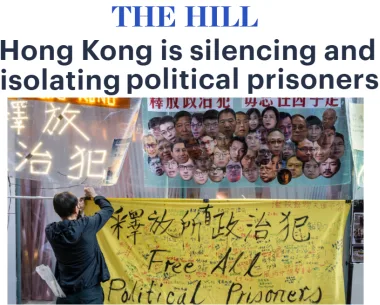‘Believe nothing until it’s officially denied.’ The CE insists all those LegCo members standing down…
…have told their own reasons, such as family reasons, [the] wish to focus more on matters they care about, academic pursuits, or the desire to pass the torch to the newcomers.
“These are their personal choices. I respect their decisions.”
Some interesting reads…
Frances Hui – an ‘absconder’ with a HK$1 million bounty – writes in The Hill about the treatment of Hong Kong’s imprisoned politicians and activists…
Solitary confinement has become routine retaliation — whether for protesting in the court, being visited by people the corrections department dislikes or for simply receiving “too many” letters. International standards prohibit solitary confinement beyond 15 days, yet in Hong Kong, its use has dramatically increased since 2020, with 42 percent of such cases exceeding one month in 2024.
Pro-democracy advocate and publisher Jimmy Lai, 77, has endured years in solitary, spending more than 23 hours daily in his cell with minimal exercise and only a sliver of natural light through a small window. Former lawmaker Leung Kwok-hung has been assigned no neighbors in adjacent cells, made to work alone and moved through the prison shrouded by tarps.
(She co-authored the CFHK report on the subject.)
Worth a look: an Asia Society Policy Institute paper on growing spirituality among China’s middle class…
Guided by Marxist theory, China’s leaders once believed that religion would wither as the country became more educated, scientifically advanced, and economically developed. However, many policies meant to hasten modernization have created the very conditions for religion to flourish. As rapid economic development allowed urbanites to become more materially comfortable, many began searching for deeper forms of meaning, guidance, and solace in times of personal or financial crisis. Beijing has attempted to meet these spiritual demands with nationalism and Confucianism-Leninism, but its attempts to win over its most important constituency — the urban middle class — are losing out to other forms of faith. Educated, affluent Chinese have increasingly sought sources of spiritual and religious authority at the margins of party control and influence, including Protestant Christianity, Tibetan Buddhism, and various New Age–inspired forms of spirituality that mix religious concepts with self-help.
The last project on David Webb’s database – remuneration of directors of Hong Kong listed companies, going back 20 years. Intro here, with suggestions for anyone who wants to do some number-crunching. The 2024 table here. Search for your fave tycoon’s kid (eg, Adrian Cheng at number 54, making HK$47 million in salary/benefits alone in 2024).


Protestant Christianity is THE perfect medicine for theses time of economic uncertainty, plummeting property values and general fear. Especially suitable for the Chinese entrepreneurial spirit would be that unique American (and South Korean) brand of “prosperity gospel” which preys upon trust, naivete and greed.
A LOT of money to be made…. Praise the LORD!!
Interesting (to me at least) real Cantonese sounding names don’t get much of a look in on the directors pay list until wayy past the top 100 or so.